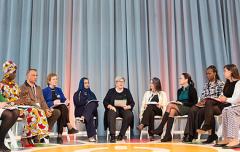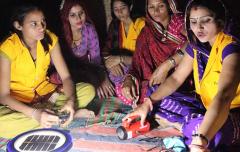"Sona No Suraj" - A Golden Sun
This blog post is part of a series Sustainable Energy for All (SEforALL) is running throughout March related to our work and partners from the People-Centered Accelerator. The series has been timed to coincide with International Women’s Day on March 8, 2018.
“We don’t need charity. Give us the right technology at affordable credit.”
Those have been the words of thousands of salt workers (Agariyas) associated with the Self Employed Women’s Association (SEWA) in India for the past 20 to 25 years. They work under scorching summer sun, with 50 kilometer per hour winds, for meager wages for a salt-pan season which lasts for six to seven months. All this happens in an arid place called Little Rann of Kutch.
Agariya sisters pump brine solution from the soil and spread it in shallow ponds for natural evaporation to crystallize salt. They sell this salt to traders for $2.50 a ton; after processing and packaging, it is then sold to end users for over $300 a ton. Quite simply, women are being exploited in this process and sidelined by male dominated traders and male members of families. Women have also depended on traders for initial working capital to buy diesel and male family members to crank up old, high-polluting diesel powered generators (used for pumping brine solution).
SEWA sees solar renewable power as a means to alleviate poverty and provide women’s empowerment. SEWA created a careful but powerful alignment between Agariya sisters, solar pump manufacturers and financial institutions – specifically, nationalized banks.
SEWA convinced its sisters that solar equipment that brings livelihood to the family has to be owned by the woman herself, and that two-decade-old diesel engines were pushing the Agariyas towards more and more poverty.
SEWA worked out a financial model to replace diesel pumps with solar pumps. In this process, it ensured that ownership of the equipment lay purely with Agariya sisters.
To buy the solar units, SEWA worked with financial institutions to create a repayment model based on savings achieved by not using diesel fuel, which accounts for about 60 percent of their costs. The Agariya sisters were happy that not only were they able to repay the installments, but also increased their overall incomes substantially.
With careful due diligence, experts from SEWA, the Grassroot Trading Network for Women (GTNfW) and industry worked closely to ensure optimal solar powered salt pumps could be designed, manufactured and assembled at the brine pumping sites. Quality checks ensured that the products were placed in the hands of the Agariya sisters.
After 400 such installations over a period of three years, it is clear that replacing diesel engines with solar is improving women’s livelihoods in the following ways: (i) Assets are being secured in the name of women (ii) women are generating income without aid from the male community (iii) women are not relying on traders for working capital.
After seeing these successes, financial banks are now convinced that this model is working and loans will be paid back. One of the visionary nationalized banks (Bank of Baroda) has stepped forward to provide equipment loans with competitive 8.3 percent annual interest rates. This not only provides affordable access to finance, but also paves the way for more women’s equality and empowerment.
With all three wheels spinning in tandem, access to credit for purchasing solar units has become much easier, leading to positive upward spirals. The state and national governments have stepped forward to provide capital subsidies and is working towards including the Agariyas under its agriculture farming policy umbrella. Due to usage of solar units, there has also been a major reduction in CO2 pollution due to reduced diesel pumping.
What began as a pilot with 10 solar pumps four years ago is now eclipsed 450 pumps as of last season. And this season alone, the number has shot up to 700 solar pumps – 2.5 times last year’s number. By October 2018, it is possible 5,000 will have replaced diesel generators.
There is strong evidence of a nexus between clean and renewable energy (Sustainable Development Goal 7) and women’s equality (SDG 5). There is also a direct impact on No poverty (SGD 1), health and well-being (SDG 3) and positive climate impacts (SDG 13).
This is why SEWA joined the People-Centered Accelerator and supports all of its objectives – among those, work stream 2 which seeks to direct more capital to gender responsive and socially inclusive energy businesses to support faster delivery of sustainable access solutions. As part of this work, the Accelerator encourages energy companies and investors to apply a gender responsible and socially inclusive lens for investments in energy access.
To find out more about joining the People-Centered Accelerator, or any other partnership opportunity with SEforALL, please email partnerships@SEforALL.org
Read more on the Accelerator here and follow #SDG7AllEqual for the latest.



